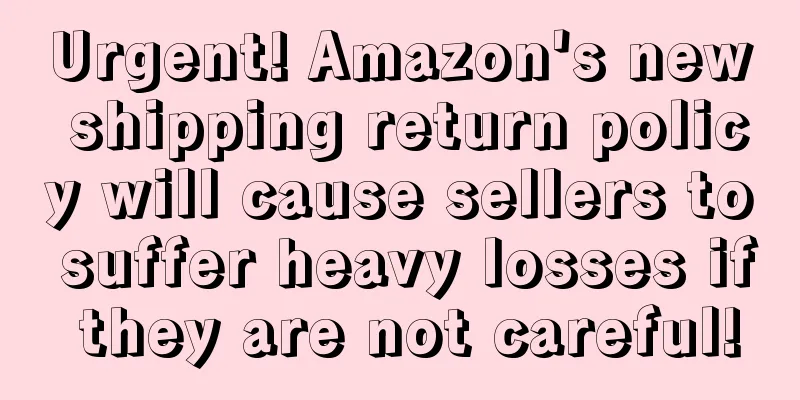Urgent! Amazon's new shipping return policy will cause sellers to suffer heavy losses if they are not careful!

|
Amazon has been updating its policies quite frequently recently. Now, my brother-in-law has started to crack down on shipping and returns, making it increasingly difficult for sellers ... Free returns policy expanded The latest news, foreign media reported that Amazon has expanded its free return policy. Buyers can return products purchased on Amazon for free before January 31, 2020, starting from November 1 and ending on December 31. Regardless of the reason for the product request, as long as the return conditions are met, a full refund can be obtained! I then checked Amazon's backend and found a shopping festival return policy. The general return policy stipulates that FBA products purchased on Amazon have a 30-day return period. Does this updated policy mean that buyers can return products purchased in November in January 2020?
If you think about it, for example, a buyer bought a product on November 1st and returned it on January 31st, 2020. This product has been with the buyer for three months! If this is a seasonal product, wouldn’t it be almost useless if the buyer returns it? ! Fortunately, I saw foreign media saying that the return window will be closed on December 31, 2019, so the above problem will not occur.
In addition to extending the return period, Amazon has also expanded the range of return categories ! This time the policy has been expanded to millions of products that were not previously included. In addition to clothes and shoes, new electronics, household items, etc. have been added. However, Amazon also stipulates that the weight of the returned product must be less than 50 pounds. In addition, buyers have a variety of options for return channels. The goods can be dropped off at a designated return location within five miles of the delivery address, or at participating locations that cooperate with Amazon without the need for labels or even boxes. For those designated return locations, Amazon said it supports free returns at 18,000 locations, including Amazon bookstores, Whole Foods Market, and UPS. At the same time, Amazon has also expanded label-free and package returns to more than 5,800 locations to limit the amount of packaging used for returns. Speaking of label-free and package return methods, I remember that some time ago, Amazon took the lead in launching this return service in Spain. Spanish customers can return products without putting them in boxes or labeling them! It is understood that users can use this service at more than 2,000 Celeritas outlets in Spain. When customers return products at the return center, they receive a barcode through the Amazon.es application or email, show the barcode at the outlet, put the product in the seller's original packaging and send it to Amazon's warehouse to help reduce the mileage required to return the product. The expansion of the free return policy during this holiday shopping season has greatly facilitated the process and method of buyers' returns and extended the return time. However, excessive convenience will also have an adverse effect on sellers. After all, the more convenient returns are, the higher the return rate of buyers will be. Xiaokeai reminds all sellers to be prepared for returns after the holidays, especially in January next year, when returns are likely to be a big problem. Overweight cargo will be charged extra Recently, many sellers discussed in the group that they received a notice from the freight forwarding company that if the actual weight of a single box exceeds 22.5kg through the US sea and air delivery channels, it will be considered overweight. If the weight exceeds the limit, a corresponding handling fee will be charged. UPS charges US$23 per piece (RMB160/piece), and Fedex charges US$10 per piece (RMB70/piece). It is understood that the reason for issuing this notice is that UPS or Fedex will charge this operating fee when it receives goods weighing more than 22.5KG and delivers them to the FBA warehouse. In fact, Amazon US has long stipulated that the weight of a single box of goods cannot exceed 50 pounds (22.5KG).
If you do not comply with the regulations and exceed the weight limit, you may be subject to shipment authority restrictions, additional fees, or rejection by the operation center. Some sellers also said that Amazon fined them $50 per box of goods for overweight. It can be seen that Amazon and express delivery have worked together to strictly control the issue of overweight goods. I would like to remind all sellers to be careful when shipping and never exceed 22.5KG. It is best to reserve about 0.3KG. In case there is an error on the scale, you will lose money if you are fined twice. |
<<: Amazon spends 1.5 billion! Competitors: We will stand out!
>>: Big news of the week! Amazon updates pricing
Recommend
Apple's new privacy rules cut off data "lifeline"! Facebook and other platforms lost nearly $10 billion in total
According to the Financial Times, the revenue of s...
Amazon's Complete List of Parodies to Fight Back Against Competitors by 2022
2022 Amazon July Hot Selling New Products Report ...
Overseas investors flock to Saudi Arabia: the most attractive blue ocean, the most difficult market to break into
I believe that every Chinese person going overseas...
What is Vendor Central (VC)? Vendor Central (VC) Review
Vendor Central (VC) is a platform launched by Amaz...
Scam, don't be fooled! I was blackmailed by a malicious buyer, and threatened to shut down the store if I didn't pay!
Just after the Shopping Festival, everyone was ea...
[DNY123 Cross-border Morning News] Shopee sold 200 million items on Double 11, and Vietnam’s Q3 e-commerce rankings are released
Friday, November 13 《DNY123》>>>Cross-bord...
U.S. holiday shopping trends: Amazon and other platforms are still popular choices for 82% of consumers
It is learned that on November 20, according to fo...
Brother-in-law adds another $1 billion! Is this market really worth such a "big bet"?
If we talk about the biggest obstacle that Amazon...
After the Ukrainian-Russian war officially broke out, how big an impact will it have on cross-border sellers!
The recent war between Russia and Ukraine was a bi...
What is Long Tail Pro? Long Tail Pro Review
Long Tail Pro is a powerful keyword research tool ...
Weak demand and excess capacity mean U.S. express delivery companies are struggling during the holiday season
According to Reuters, in the past few years of the...
What is Qianmo International Logistics? Qianmo International Logistics Review
Qianmo International Logistics (Shenzhen Qianmo In...
What is Traackr? Traackr Review
Traackr is a statistical tool that records your fo...
What is VE? VE Review
VE (Amazon Vendor Express), sellers sell products ...
What is ShopeePay? ShopeePay Review
ShopeePay is Shopee’s e -money service that can no...









